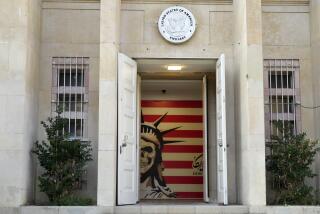When a regime came tumbling down
Five years ago Wednesday, U.S. forces entered the heart of the Iraqi capital, and Saddam Hussein’s regime fell. While much of the world watched the downfall of Hussein and the destruction of his huge statue in central Baghdad’s Firdos Square on television, Iraqis lived it. They have memories of what they were feeling as Hussein was toppled from power. Here are some of them:
--
I knew everything that was happening because of the hidden satellite dish in my home. If I had been caught with it during Hussein’s time, I would have been jailed and fined. I kept the generator running all the time so I could watch CNN and other international news channels.
On April 9, I watched on live TV as Hussein’s statue was pulled down. As soon as I saw this, I decided it was a good time to go out and look for a job with the journalists I had known before the war through my Internet business.
My car had no gas -- I had used it all for my generator to keep the TV going. I figured there must be a crazy taxi driver on the streets, willing to dodge bullets and tanks for the right amount of money. Sure enough, I found one. He wanted $50 to take me to Firdos Square. That was nearly a month’s income. I said OK.
When I arrived, people were dancing and chanting on what was left of the statue. I needed to reach the Palestine Hotel nearby, where foreign journalists stayed, but as I approached the hotel gate I saw something I thought existed only in action movies: a huge man in dark glasses carrying an M-16, with a tube running out of his mouth. I realized later he was drinking water through the tube.
I thought he might shoot me if I walked toward him. I hoped he would notice me and say something, but he didn’t. I decided to try my luck, and I waved to get his attention.
“What do you want?” he shouted. Suddenly, my fluent English was forgotten. I managed to stammer something like, “Press! I have journalist friends inside the hotel.”
He asked me for an ID. I showed him my official Iraqi identification. It wasn’t good enough.
“Negative! Back off!” he yelled.
I asked him what the problem was.
“Your ID doesn’t say press!” was the answer.
I headed back to where people were still pummeling the statue’s remains.
Someone yelled my name. It was a friend from AP Television News who had just arrived from Jordan.
“Man, I’m glad you survived the war. What are you doing here?” he said. I explained I was looking for a job. “You got it!” my friend said, and he began leading me toward the hotel. I warned him about the action-figure U.S. soldier at the gate.
My friend took his own business card, which identified him as press, and stuck my photograph above his contact information.
I had what I needed: an ID with my picture and the word “press” on it.
The next morning, I flashed it at the soldier as I entered the Palestine Hotel to begin my new life.
-- Mohammed Rasheed, Times staff writer
More to Read
Sign up for Essential California
The most important California stories and recommendations in your inbox every morning.
You may occasionally receive promotional content from the Los Angeles Times.










